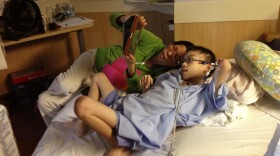
Amanda Aronczyk
Amanda Aronczyk (she/her) is a co-host and reporter for Planet Money, NPR's award-winning podcast that finds creative, entertaining ways to make sense of the big, complicated forces that move our economy. She joined the team in October 2019.
Before that, she was a reporter at WNYC, New York Public Radio, where she contributed stories to Radiolab, On the Media, United States of Anxiety, The Brian Lehrer Show and more. Aronczyk covered science and health, and she fondly remembers from voters to measure stress, and using nose swabs to solve a classic office mystery: ? She was also the lead reporter on the award-winning to PBS' "The Emperor of All Maladies," presented by NPR and WNYC.
Aronczyk also teaches audio journalism at the Newmark Graduate School of Journalism at CUNY.
-
Cancer treatment for kids has changed dramatically since the 1960s. Back then, doctors experimented with approaches that seemed promising but were also potentially toxic. Some survivors look back.
-
After being diagnosed with cancer, people often ask one question first: "How long do I have?" Doctors usually overestimate the time, and patients often don't understand it's a range, not one number.
-
When a child falls ill with cancer, many of the drugs that might help are either experimental or unapproved for use in kids.
-
Offering a homeless person an apartment with access to a doctor and social services may be cheaper than paying for emergency room visits and jail or shelter stays. But should Medicaid help with rent?



